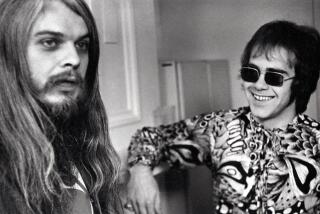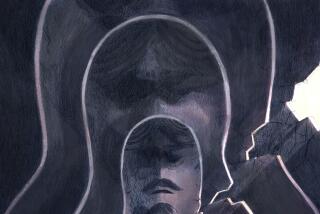Was Dad a Cad? Son Uncovers Facts on a Man He Hardly Knew
- Share via
“I’ll change your name of course,” Luke, the narrator of “A Few Corrections,” promises his Uncle Conrad, one of the family members he’s been interviewing to write a novel based on the life of his recently deceased father, Wesley Sultan, a dull-seeming Midwestern businessman. The novel, he further assures his uncle, will contain only composite characters.
“If you change my name,” snarls Conrad, “I’ll come at you with a crew oar and break your silly-looking nose. . . . Jesus, don’t you see anything? Luke, you’ve got to get me down exactly! Otherwise, what’s the point? . . . Luke, I demand you do me justice!”
It’s practically become a truism in some quarters that there’s no such thing as truth. Even the most scrupulous historian, we’re assured, cannot help distorting his or her subject. Thus, it is refreshing to come across a novel dedicated to the proposition that it is not only feasible but right for a writer (even a writer of fiction) to engage in a continual process of correcting errors, lies and omissions in the pursuit of accuracy.
As seems to have become his wont, poet and novelist Brad Leithauser begins this, his fifth, novel with an epigraph drawn from his previous one. He quotes an observation made by a character in his 1997 book, “The Friends of Freeland”: “It occurred to me that a whole novel might be devoted to the rewriting of an obituary.”
The obituary that is the subject of “A Few Corrections” records the passing of one Wesley Sultan: a 63-, no, make that 62-year-old Michigan businessman, depicted as a respectable sort of Chamber of Commerce and Rotary Club member who sang in the church choir. Twice married, the father of three children, Wesley, it seems, was just beginning to enjoy his retirement when he was struck down by heart failure. But, as his adult son Luke discovers in the course of his research, not only does this dry summation not do justice to Wesley’s life; it’s not even factually correct. And in the process of getting the facts right, some larger truths also emerge. A high school dropout, Wesley lied about his age to land a job with Great Bay Shipping Co. He did not retire voluntarily but was fired from his job by a foundering company anxious to deny him his health benefits. His first wife, Sally, was not his first wife; he had married before but kept it a secret. His last wife, a pretty, young thing named Tiffany, had thrown him out shortly before his death on account of his incessant womanizing. Indeed, Wesley’s salient feature, his raison d’e^tre, has been left out of his obituary: his need to charm every woman he’s ever met.
A cad who used women or a romantic who genuinely loved them? A trickster or a fool? As he interviews those who knew him, Luke not only gains a fuller picture of the father he never really knew, but he also learns a lot about the people he is interviewing: his Uncle Conrad, a former high school wrestler star gone to fat; his humble Aunt Adelle, whose kitchen is adorned with a sampler proclaiming “Home Is Where the Heartburn Is”; Wesley’s sweet last wife, Tiffany, who’s not as sweet as she seems; and even his own mother, Sally, a highly intelligent and sensible woman who surely must have had some good reason for marrying a dimwitted fellow like Wesley in the first place.
There’s humor and pathos in Wesley’s story: “It could well be argued,” suggests the narrator hopefully, “that the contours of his life speak volumes about a country hurtling forward so rapidly that its values and mores, its jokes and idioms, its graces and ambitions expire even before the generation that begot them. Wesley Cross Sultan’s tale might be viewed as that of a man who slowly perceived that his charm had grown quaint, that he was someone whom the world had outrun.” Leithauser’s crisp style and wry tone have a charm that is longer-lasting. But, although Luke’s research and “corrections” result in a more accurate portrait, it is still a somewhat superficial one, leaving us with a novel whose whole is slightly less than the sum of its parts. But this does not detract from the fact that “A Few Corrections” is a pleasure to read, full of deft touches and quirky insights, never dull, always diverting.
More to Read
Sign up for our Book Club newsletter
Get the latest news, events and more from the Los Angeles Times Book Club, and help us get L.A. reading and talking.
You may occasionally receive promotional content from the Los Angeles Times.










